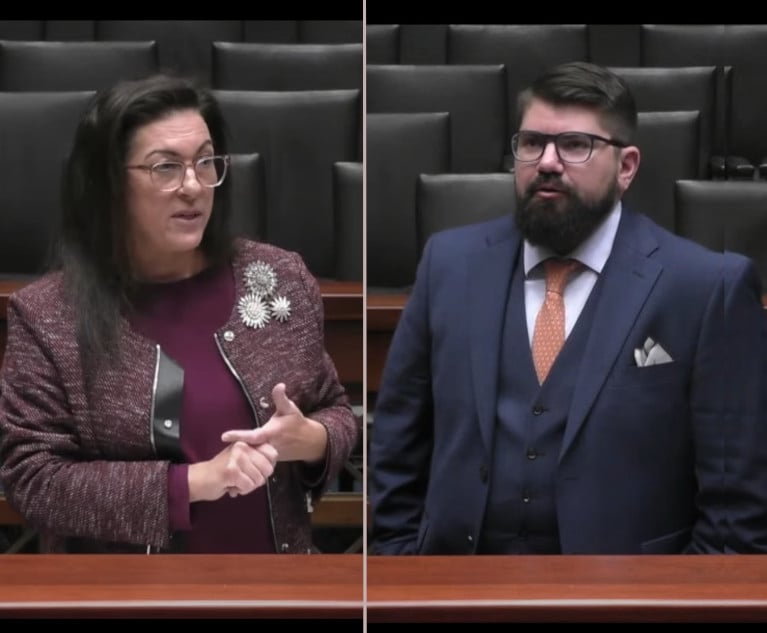 Photo: Courtesy of University of Texas at Austin
Photo: Courtesy of University of Texas at AustinNew Attack on Race-Based Admissions at UT Austin Seeks to Succeed Where 'Fisher' Failed
"Regardless of what the U.S. Supreme Court said in Fisher, the Texas Constitution prevents UT or any state actor from discriminating, from considering race,” Allan Van Fleet said.
May 24, 2019 at 04:15 PM
4 minute read
It's deja vu all over again for The University of Texas at Austin, facing a new lawsuit that challenges its race-based admissions policies. But the new legal strategy at play might alter the outcome.
This time around, the lawsuit challenges racial preferences in admissions under the Texas Constitution and state law, unlike the previous federal-law challenge in the high-profile case Fisher v. University of Texas at Austin.
In the first case, the university won a 2016 U.S. Supreme Court ruling that said a narrowly tailored raced-based admission policy was constitutional if it was necessary to achieve a diverse student body.
The new case, Students for Fair Admission v. University of Texas at Austin, filed in Travis County District Court, alleges that UT's admissions policies intentionally discriminate against “disfavored racial groups” like whites and Asians. The plaintiff, a nonprofit called Students for Fair Admissions, alleged that racial preferences in admissions violate the Texas Constitution's Equal Rights Amendment protections against discrimination and guarantee of equal protection, and a state law that prohibits government officers or employees from stopping someone from participating in a state program—including a university—because of a person's race, religion, color, sex or national origin.
The new plaintiff might have better chances because the claims arise under Texas law, according to lawyers on both sides of the issue.
Houston solo practitioner Allan Van Fleet, who wrote an amicus brief that supported the university's position in Fisher, said he feels that UT Austin still needs to consider race in admissions so it can have a diverse student body. But he admitted that this plaintiff's legal strategy might work.
“The Texas Constitution and its equal protection clause—it differs enough from the federal constitution, that under Texas constitutional law, regardless of what the U.S. Supreme Court said in Fisher, that the Texas Constitution prevents UT or any state actor from discriminating, from considering race,” Van Fleet said.
Mark Pulliam, who is retired from a 30-year career as a Latham & Watkins partner and now works as a conservative writer and blogger, said he thinks raced-based admissions are an “abomination,” yet he does agree with Van Fleet's assessment about the state law claims here.
“State law is equally important in Texas as the federal law. Eventually, this is going to work its way up to the Texas Supreme Court, and the lay of the land may very well be different,” said Pulliam, who's also a plaintiff in a lawsuit that challenges the constitutionality of mandatory bar membership and dues in Texas.
Students for Fair Admissions has filed similar lawsuits against Harvard University and the University of North Carolina-Chapel Hill. The nonprofit's president, Edward Blum, also directed the Project on Fair Representation, an Austin nonprofit that sponsored Abigail Fisher in the previous legal challenge.
“The Texas Constitution enshrines a color-blind vision of equality, which forbids universities to discriminate on the basis of race. We believe that most Texas judges and justices will agree with our interpretation of the Texas Constitution,” said Blum in a statement.
Students for Fair Admissions filed the same lawsuit against the university in 2017 and a district judge in late 2018 dismissed it because a standing member applied as a music major and took an audition rather than being subjected to UT's holistic review process, which uses race as a factor.
In this second try, however, the lawsuit claims the school denied multiple members admission based on race.
University spokesman JB Bird said in a statement, “We remain confident in the lawfulness and constitutionality of UT Austin's holistic admissions policy.”
Read the petition.
|This content has been archived. It is available through our partners, LexisNexis® and Bloomberg Law.
To view this content, please continue to their sites.
Not a Lexis Subscriber?
Subscribe Now
Not a Bloomberg Law Subscriber?
Subscribe Now
NOT FOR REPRINT
© 2024 ALM Global, LLC, All Rights Reserved. Request academic re-use from www.copyright.com. All other uses, submit a request to [email protected]. For more information visit Asset & Logo Licensing.
You Might Like
View All
How Uncertainty in College Athletics Compensation Could Drive Lawsuits in 2025

'It's Like They Lynched You:' Law Professor's Discrimination Claim Reaches High Court
7 minute read
Uvalde Shooting 'Fresh in Everyone's Mind:' Lone Dissenting Judge Disagrees with School's Disciplinary Decision Over Pellet Gun

Newsmakers: University of Houston Law Center Receives $1.25 Million Gift for Mediation Clinic
Trending Stories
- 1Second Circuit Upholds $5M Judgment Against Trump in E. Jean Carroll Case
- 2Clifford Chance Hikes Partner Pay as UK Firms Fight to Stay Competitive on Compensation
- 3Judicial Conduct Watchdog Opposes Supreme Court Justice's Bid to Withdraw Appeal of Her Removal
- 4Lessons in Mediation & Negotiation: Attorneys' Reflections on Jimmy Carter
- 5Legal Issues to Watch in the US Appeals Courts in 2025
Who Got The Work
Michael G. Bongiorno, Andrew Scott Dulberg and Elizabeth E. Driscoll from Wilmer Cutler Pickering Hale and Dorr have stepped in to represent Symbotic Inc., an A.I.-enabled technology platform that focuses on increasing supply chain efficiency, and other defendants in a pending shareholder derivative lawsuit. The case, filed Oct. 2 in Massachusetts District Court by the Brown Law Firm on behalf of Stephen Austen, accuses certain officers and directors of misleading investors in regard to Symbotic's potential for margin growth by failing to disclose that the company was not equipped to timely deploy its systems or manage expenses through project delays. The case, assigned to U.S. District Judge Nathaniel M. Gorton, is 1:24-cv-12522, Austen v. Cohen et al.
Who Got The Work
Edmund Polubinski and Marie Killmond of Davis Polk & Wardwell have entered appearances for data platform software development company MongoDB and other defendants in a pending shareholder derivative lawsuit. The action, filed Oct. 7 in New York Southern District Court by the Brown Law Firm, accuses the company's directors and/or officers of falsely expressing confidence in the company’s restructuring of its sales incentive plan and downplaying the severity of decreases in its upfront commitments. The case is 1:24-cv-07594, Roy v. Ittycheria et al.
Who Got The Work
Amy O. Bruchs and Kurt F. Ellison of Michael Best & Friedrich have entered appearances for Epic Systems Corp. in a pending employment discrimination lawsuit. The suit was filed Sept. 7 in Wisconsin Western District Court by Levine Eisberner LLC and Siri & Glimstad on behalf of a project manager who claims that he was wrongfully terminated after applying for a religious exemption to the defendant's COVID-19 vaccine mandate. The case, assigned to U.S. Magistrate Judge Anita Marie Boor, is 3:24-cv-00630, Secker, Nathan v. Epic Systems Corporation.
Who Got The Work
David X. Sullivan, Thomas J. Finn and Gregory A. Hall from McCarter & English have entered appearances for Sunrun Installation Services in a pending civil rights lawsuit. The complaint was filed Sept. 4 in Connecticut District Court by attorney Robert M. Berke on behalf of former employee George Edward Steins, who was arrested and charged with employing an unregistered home improvement salesperson. The complaint alleges that had Sunrun informed the Connecticut Department of Consumer Protection that the plaintiff's employment had ended in 2017 and that he no longer held Sunrun's home improvement contractor license, he would not have been hit with charges, which were dismissed in May 2024. The case, assigned to U.S. District Judge Jeffrey A. Meyer, is 3:24-cv-01423, Steins v. Sunrun, Inc. et al.
Who Got The Work
Greenberg Traurig shareholder Joshua L. Raskin has entered an appearance for boohoo.com UK Ltd. in a pending patent infringement lawsuit. The suit, filed Sept. 3 in Texas Eastern District Court by Rozier Hardt McDonough on behalf of Alto Dynamics, asserts five patents related to an online shopping platform. The case, assigned to U.S. District Judge Rodney Gilstrap, is 2:24-cv-00719, Alto Dynamics, LLC v. boohoo.com UK Limited.
Featured Firms
Law Offices of Gary Martin Hays & Associates, P.C.
(470) 294-1674
Law Offices of Mark E. Salomone
(857) 444-6468
Smith & Hassler
(713) 739-1250






